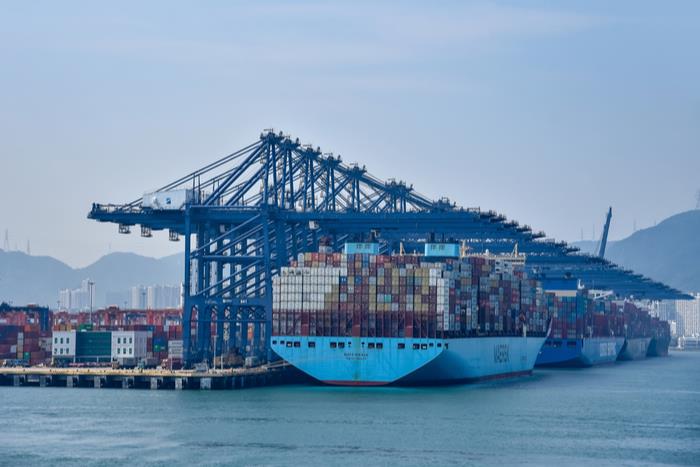Maersk warned that the current port congestion in South China — Yantian/Shekou/Nansha Port — could cause a 'much bigger disruption' to its operations than the blockage of the Suez Canal in March when Ever Given ran aground and got stuck blocking the major waterway.
In a statement, the container line said with a steady inbound flow every day, the total queue of vessels waiting to berth at the Port of Yantian increases.
It noted, however, that although the Port Authority has been successful in re-opening the west port yard for laden import pickup and one more berth — allowing a maximum of seven vessels alongside at the same time which in turn raised productivity towards 45% of normal levels, schedule reliability will "continue to suffer" with an average waiting time of 16 days and counting."

In its June 11 advisory, Maersk noted it is omitting some port calls and diverting others to nearby ports to mitigate the impact of the congestion in its schedules.
"In diverting our vessels, we are closely monitoring the situation in neighboring ports. The current average waiting time in Shekou, Nansha, and Hongkong is between 2-4 days, but as more carriers omit Yantian, this number is expected to rise," Maersk said, adding that deciding which port to divert to will always be made with the objective of minimizing supply chain delays.
"We also want to advise that shipments not directly impacted by the Yantian situation might also be affected as we adjust our network to avoid port congestions and to limit the overall net loss of ocean network capacity due to omitting the Port of Yantian," it added.
Bigger disruption than Suez Canal blockade
Separately, Maersk Asia Pacific Managing Director Ditlev Blicher noted that the delays caused by the current situation at the Yantian port — currently operating at around 40% of capacity — could drag on to July.
Yantian Port is a key export hub in China.
"We're expecting that to continue for the next month with significant delays for vessels to be able to berth," he told a virtual media briefing.
Maersk earlier noted that the situation "continues to deteriorate as more positive Covid cases have been confirmed" in Shenzhen where Yantian port and Shekou port are located and in Guangzhou where Nansha port is located.
Vincent Clerc, AP Moller-Maersk's CEO of Ocean & Logistics said the outlook on the disruptions could be worse than the impact of the six-day blockade of the Suez Canal which reports earlier said has impacted around 422 ships as authorities imposed a temporary suspension of navigation through the waterway last March 25 — forcing some ships to take the long alternate route around the Cape of Good Hope, adding to the time and cost of using the route at Africa's southern tip.
"I would say this for us is a much bigger disruption than the Ever Given getting stuck in the Suez Canal for some days because of the duration and the importance of Yantian as a gateway," Clerc said.
"Right now, we have vessel delays of up to 16 days outside Yantian which is, of course, going to cause a significant ripple effect across the network from a reliability perspective," he added.
"We will see lost sailings as a result of these delays which will only compound the congestion that we’re seeing," Clerc continued. "I won't beat around the bush when it's happening in a port as significant as Yantian this will have significant ripple effects."
More stress on shipping, supply chains
The disruption at the world’s fourth-busiest container port is adding a new layer of pressure to the already fragile global supply chain earlier hit by the coronavirus pandemic and the blockade of the Suez Canal this year.
Maersk added: "While ETAs are jeopardized, it is too early to indicate the total number of delays as we are doing our utmost to mitigate this."
Shenzhen — recognized as China's Silicon Valley — has recently faced increased restrictions, which in turn are impacting port operations at one of China’s busiest export terminals, due to newly reported cases on Covid-19 in the area.
The increased measures began in late May after cases of the coronavirus were diagnosed among workers within the port. Chinese and port officials then implemented stringent measures and disinfection routines to contain the spread.
Although the situation has improved since then and port officials are expected to resume operations, some restrictions are seen to continue.




